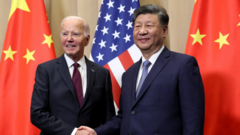As Xi Jinping meets with Joe Biden for the final time, he emphasizes the importance of cooperation between the US and China while expressing concern over potential volatility with Donald Trump’s entry to power. Both leaders acknowledged the ups and downs in bilateral relations and committed to avoiding conflict.
Xi Jinping's Last Stand with Biden: A Promise to Cooperate with Trump

Xi Jinping's Last Stand with Biden: A Promise to Cooperate with Trump
In a crucial meeting at the APEC summit, Xi Jinping calls for stable US-China relations while preparing for Donald Trump's upcoming presidency.
In a pivotal meeting held at President Xi Jinping's hotel during the Asia-Pacific Economic Cooperation (APEC) summit in Peru, the Chinese leader expressed his willingness to collaborate with incoming President Donald Trump, marking his final face-to-face interaction with Joe Biden. Xi asserted the necessity of a stable US-China relationship, cautioning that viewing each other as adversaries would only lead to setbacks in diplomatic ties.
Post-meeting, a detailed readout from Beijing conveyed Xi's message that a new Cold War is unwinnable and that efforts to contain China would ultimately fail. He categorized a stable relationship with the United States as essential, not just for both nations but for global stability.
Meanwhile, Biden echoed the sentiment that competition between the two superpowers must not escalate into hostility, emphasizing the responsibility both nations share to maintain peace. He noted that throughout his term, the relationship had managed to withstand moments of tension, reaffirming the significance of strategic communication.
The meeting underscored acknowledgment of the mixed dynamics in US-China relations during Biden's presidency, with both leaders identifying areas where tensions have eased, particularly regarding trade and Taiwan. However, analysts anticipate that Trump's return to office could spark further volatility in relations, highlighted by his inclination to impose high tariffs on Chinese imports.
Trump's presidency was marked by a strategic confrontation with China, and his controversial labeling of COVID-19 as a "Chinese virus" stressed the fault lines in diplomacy. Although the Biden administration sought to manage this rivalry constructively, it continued implementing tariffs while strengthening defense alliances across the Asia-Pacific to counter China’s assertive moves.
Experts suggest that while China is keen to negotiate, it faces uncertainty regarding Trump's unpredictable strategies which could prompt retaliatory measures if he attempts to enforce increased tariffs. Overall, Biden's tenure saw a mix of frank discussions with Xi, including agreements on combating issues like narcotics and climate change, even as complexities in the relationship persisted.
As the Chinese leadership braces for Trump's return, questions linger regarding the future of US-China interactions amidst the backdrop of economic recovery and geopolitical strategy.





















